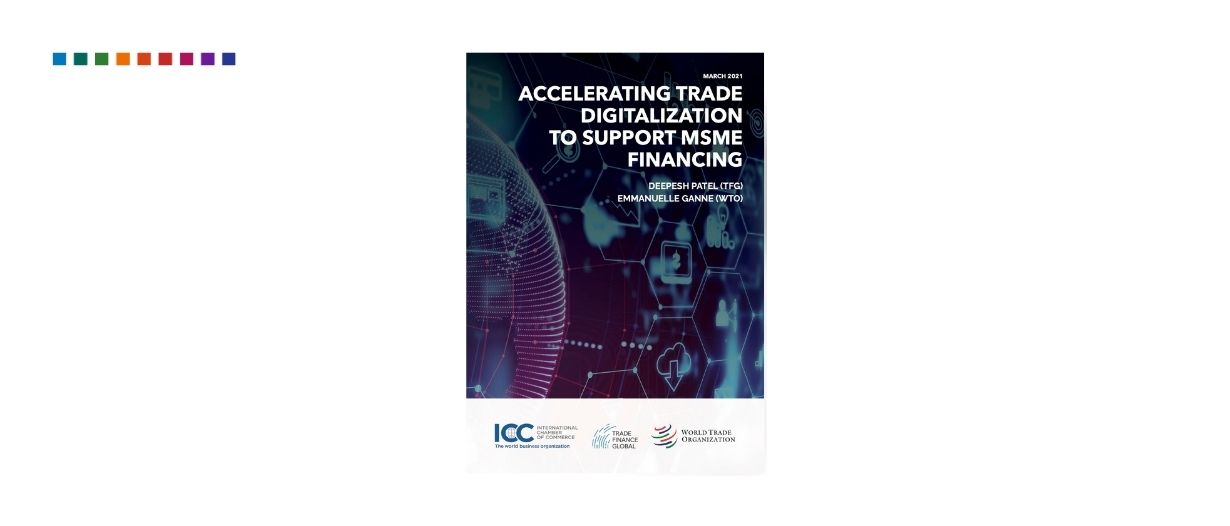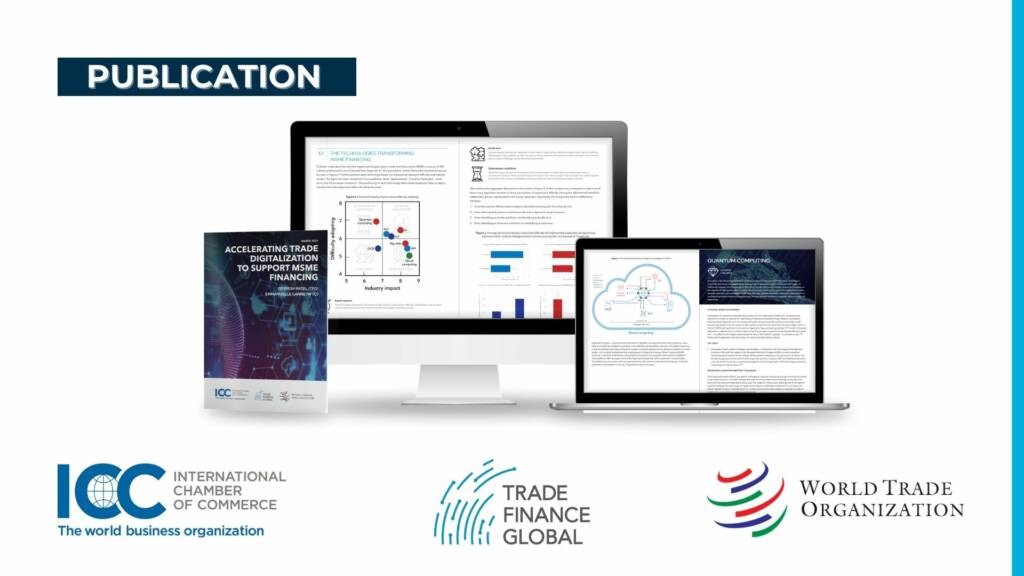Paris, London, Geneva, 30, March 2021. World Trade Organization (WTO), Trade Finance Global (TFG) and International Chamber of Commerce (ICC) have today launched their latest publication ‘Accelerating trade digitalization to support MSME financing’
This new publication, authored by WTO’s Emmanuelle Ganne and TFG’s Deepesh Patel, dives into the benefits and deployment challenges of eight prominent technologies that have the potential to disrupt the international trade landscape and to facilitate MSME financing. The technologies, which include cloud computing, optical character recognition (OCR), internet of things (IoT), application programming interface (API), distributed ledger technology (DLT), big data analytics, artificial intelligence (AI), and quantum computing, have been individually identified as either lucrative challenges, rapid rewards, small wins, or downstream ambitions on the basis of interviews with 34 industry experts and 105 survey responses.

Xiaozhun Yi, Deputy Director-General, World Trade Organization (WTO) said:
“The MSME financing gap is a reality that cannot be ignored and that should be tackled with determination if we wish to ensure that small players are given a chance to thrive. Technological tools and data-driven solutions open a range of new opportunities for MSMEs in this regard.”

John W.H. Denton AO, Secretary-General, International Chamber of Commerce (ICC), added:
“The technology is there, making interesting promises. Yet MSMEs continue to struggle to access financing, including trade finance, with ripple effects on their ability to grow and trade. How can we unleash the potential of technology? Coordinated action on issues ranging from standards, to how to leverage data, what type of data, digital identity, regulation, and how to close the digital divide, is needed.”
The study highlights that, in light of the COVID-19 pandemic, going digital to support MSME financing is no longer optional, but necessary. This desperate necessity for paperless workarounds has set the industry on a digital course.

Deepesh Patel, Editorial Director, Trade Finance Global (TFG) said:
“This publication seeks to identify some of the most pressing challenges confronting MSMEs in their quest for acquiring financing, understand them, and explore the potential application of digital technologies to mitigating their impact.”
The publication notes, however, that digitalization efforts are hindered by an unfriendly regulatory environment that often does not recognize e-signatures and e-documents. Technology cannot thrive in a regulatory vacuum

Emmanuelle Ganne, Senior Analyst, WTO added:
“Unfortunately, we are still facing regulatory challenges on the acceptance of e-signatures and e-documents. For these technologies to realize their full potential, adjustments are needed to the current regulatory framework.”

Oswald Kuyler, Managing Director, ICC DSI notes:
“Developing globally accepted standards to remedy the digital island problem will be key to empowering the digitalization of trade and trade finance and to allowing small businesses to benefit from it.”
The publication highlights the need for a multipronged approach to unleash the potential of digital technologies to facilitate MSME trade financing. First, is the need for the development of globally accepted standards to remedy the digital island problem. Second, developing a common framework for leveraging data to better assess financing risk. Third, creating an enabling regulatory framework that recognizes e-signatures and e-documents and is in line with the UNCITRAL MLETR. Fourth, a strong need for a trusted global digital identity system for companies. Fifth, an acceleration of efforts to bridge the digital divide.
No stakeholder has the clout to affect this change alone. Industry, governments, financial regulators and international organizations all have a key role to play in this regard. Policymakers, technologists, practitioners, bankers, and all other stakeholders must work together to devise, agree and then execute a roadmap that will catalyze action and lay the foundation for the digitalization of trade and for the digital technologies discussed in this publication to have a potentially transformative impact on MSME financing.
The study was published at the WTO Global Trade & Blockchain Forum on the 30th March 2021 and is available to download here: https://www.tradefinanceglobal.com/editions/tradetech-whitepaper-2021/.
The study was published at the WTO Global Trade & Blockchain Forum is available to download.






























